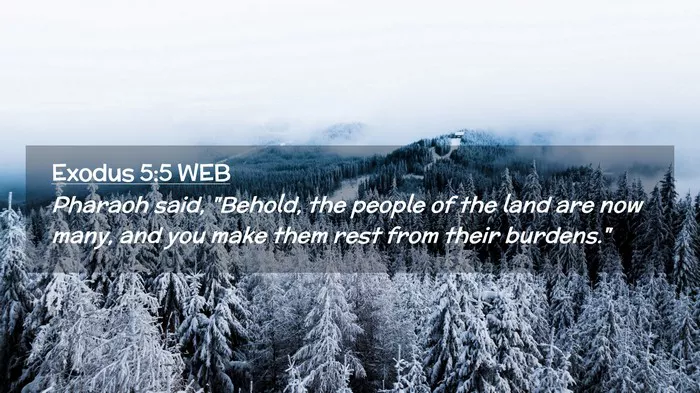Read the Daily Bible Verse – Exodus 5:5 To Strengthen Your Spiritual Journey.
Exodus 5:5 presents a significant moment in the dialogue between Moses, Aaron, and Pharaoh during the Israelites’ bondage in Egypt. Pharaoh’s resistance to God’s command to let the Israelites go highlights his growing defiance and underscores the dynamics of oppression, authority, and divine sovereignty.
This article will explore the verse in detail, examining its historical and theological context, its applications for life, comparisons with other biblical passages, and its relevance for believers today.
The Context on Exodus 5:5 KJV
The Verse in Question
Exodus 5:5 states:
“And Pharaoh said, Behold, the people of the land now are many, and ye make them rest from their burdens.”
This verse follows Moses and Aaron’s initial request to Pharaoh to let the Israelites go into the wilderness to worship the Lord. Pharaoh, unwilling to acknowledge God’s authority, responds with disdain and perceives the request as a threat to his control over the Israelite labor force.
Historical Background
The Israelites, descendants of Jacob, had grown into a vast population during their time in Egypt. Over time, their numbers became a source of fear for the Egyptians, leading to their enslavement and harsh treatment under successive Pharaohs (Exodus 1:8–14).
Moses, chosen by God to lead the Israelites out of bondage, was commanded to confront Pharaoh with God’s demand for their release. Pharaoh, however, saw their request not as a religious necessity but as an economic disruption.
The Meaning of Exodus 5:5
Pharaoh’s Concern
Pharaoh refers to the Israelites as “the people of the land,” emphasizing their status as laborers and his dependence on their work. His statement, “and ye make them rest from their burdens,” accuses Moses and Aaron of interfering with the labor system by giving the Israelites a reason to pause their work.
Pharaoh’s words reveal his perception of the Israelites as an economic resource rather than individuals with inherent value. This reflects his hardened heart and his prioritization of power and productivity over compassion and justice.
A Dismissal of Divine Authority
Pharaoh’s refusal to acknowledge the legitimacy of Moses and Aaron’s request underscores his resistance to God’s authority. His reaction highlights a deeper spiritual issue: a rejection of Yahweh as the true God.
Exodus 5:5 Application in Life
Recognizing Human Dignity
Pharaoh’s treatment of the Israelites as mere laborers serves as a reminder of the importance of recognizing the dignity and worth of every individual. Christians are called to view others through the lens of God’s love, acknowledging their value beyond their contributions to society.
Trusting God in Opposition
Moses and Aaron’s encounter with Pharaoh teaches believers to trust in God’s plan even when faced with rejection or resistance. Faithfulness to God’s commands is crucial, regardless of immediate outcomes.
Advocating for Justice
Pharaoh’s oppressive attitude challenges Christians to advocate for justice and freedom for those who are marginalized or exploited. This verse reminds believers of their responsibility to stand against systems that dehumanize or oppress.
Comparison with Other Biblical Texts
Isaiah 58:6–7: True Liberation
Isaiah 58:6–7 speaks of the Lord’s desire to “loose the bands of wickedness” and “let the oppressed go free.” This passage parallels the mission of Moses and Aaron to free the Israelites, emphasizing God’s heart for justice and liberation.
Matthew 25:40: The Value of People
Jesus teaches in Matthew 25:40, “Inasmuch as ye have done it unto one of the least of these my brethren, ye have done it unto me.” This verse challenges believers to view and treat others with the care and respect they would show to Christ Himself, in stark contrast to Pharaoh’s attitude.
Proverbs 31:8–9: Speaking for the Oppressed
Proverbs 31:8–9 commands believers to speak up for those who cannot speak for themselves and to defend the rights of the destitute. Moses and Aaron’s advocacy for the Israelites embodies this biblical principle.
Modern-Day Relevance
Workplace Ethics
Pharaoh’s exploitation of the Israelites as a labor force prompts reflection on modern workplace ethics. Employers and leaders are called to treat workers with fairness and dignity, prioritizing their well-being over profit.
Resistance to Injustice
Believers today are often called to confront systemic injustices, whether in the form of exploitation, discrimination, or oppression. Exodus 5:5 encourages Christians to remain steadfast in advocating for righteousness and justice, even when faced with resistance.
Faith Amidst Challenges
Moses and Aaron’s unwavering faith in God amidst Pharaoh’s resistance inspires believers to trust in God’s sovereignty, even when His plans encounter human opposition.
Conclusion
Exodus 5:5 is a powerful reminder of the challenges faced by those who seek to follow God’s commands in a world resistant to His authority. Pharaoh’s hardened heart and disregard for the Israelites’ well-being contrast with the compassion and justice that God desires.
For modern believers, this verse calls for trust in God’s sovereignty, advocacy for justice, and recognition of the inherent value of every individual. As Christians reflect on this passage, they are encouraged to align their lives with God’s purposes, standing firm in faith and striving for a world that reflects His love and righteousness.
In the face of opposition, may we, like Moses and Aaron, remain faithful to God’s calling, trusting that His plans will prevail and His glory will be revealed.
Exodus 5:5 Commentary
Pharaoh’s Perspective
Pharaoh’s statement reflects his worldview, where the economic interests of Egypt take precedence over the spiritual and physical well-being of the Israelites. His attitude reveals a lack of compassion and an unwillingness to recognize the Israelites’ God-given rights.
Theological Insights
Exodus 5:5 highlights the tension between human authority and divine sovereignty. Pharaoh’s rejection of God’s command serves as a reminder that human resistance cannot thwart God’s ultimate plan.
You Might Be Interested In:
- Exodus 5:1 Meaning, Context & Commentary
- Exodus 5:3 Meaning, Context & Commentary
- What Does Exodus 5:4 Mean?

